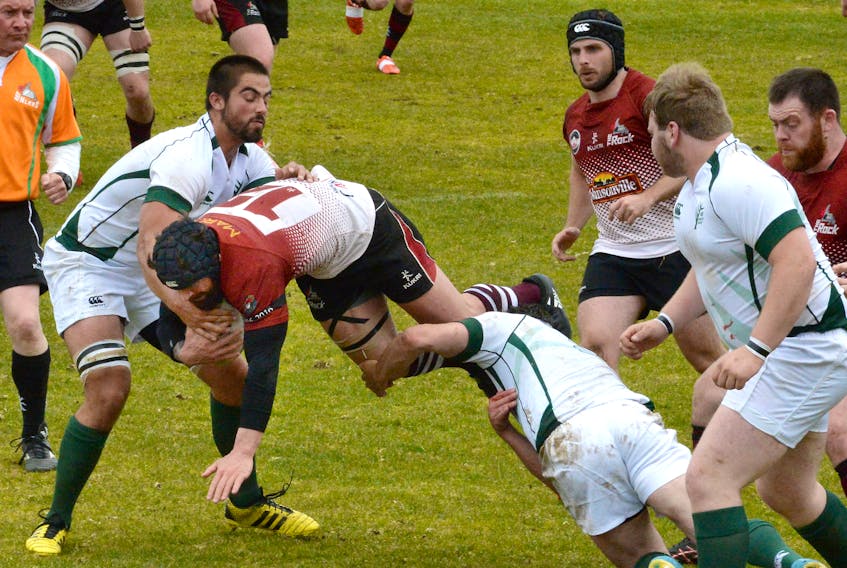There’s a strong possibility The Rock senior men’s rugby team will re-emerge as a provincial squad on the national level next season in another Rugby Canada Super League format, a move that should give the sport a shot in the arm here at home.
The 10-year-old Canadian Rugby Championship is, according to Newfoundland rugby’s Pat Parfrey, in a “vulnerable” position which could lead to the reformation of the Super League.
Founded in 1998, the RCSL featured teams from eight provinces taking part in a nation-wide senior men’s rugby league. In 2009, the league was disbanded in favour of a regional approach in what was first known as the Americas Rugby Championship, later to become the Canadian Rugby Championship, or CRC.
So the fact that Rugby Canada is considering returning to a competition that pits province vs province is good for a team like The Rock from Newfoundland, which will have more players suiting up at the national level.
From a national perspective, however, scrapping the CRC won’t be good for the game at the Rugby Canada level.
“From a Newfoundland standpoint,” Parfrey said, “I think it’s advantageous and far better for us to play as the Newfoundland Rock in Super League.
“From a Canadian perspective, I think regional play with best-on-best is more beneficial.”
Prior to 2010, the Rugby Canada Super League featured two conferences — East and West — with the Rock joining New Brunswick, Nova Scotia, Quebec, Ottawa, Ont. and Niagara, Ont. in the East.
The Rock — now known as the Atlantic Rock — won the Canadian Rugby Championship title in 2010 on home soil, the first year Rugby Canada went with a regional approach to national senior men's play. Joining the Rock in the CRC were Ontario, the Prairies and British Columbia.
Prior to that, The Rock won three RCSL titles.
One of the big problems which has come out of the regional format is a lack of games. For the past three summers, each team in the CRC has made only four starts. The 2015 campaign was but a one-weekend tournament, because of the Rugby World Cup.
Next year is a World Cup year once again (the tournament is being played in Japan), and in addition to that, the Ontario Arrows, a rugby union club based out of Toronto, will play in Major League Rugby putting that province’s participation in the CRC into question.
This past season, The Newfoundland Rock, along with teams from Nova Scotia, New Brunswick, Quebec and the Ottawa area, played in the Eastern Canadian Super League, a prelude to the 2018 CRC that was contested in August.
From the Eastern Canadian circuit, a squad was selected to suit up for the regional Atlantic Rock squad, based out of St. John’s.
Nine Newfoundlanders were on that team.
“No question the number of Newfoundlanders on the Atlantic Rock has dropped,” Parfrey said. “We are in the minority. In the past, we had the majority of players.”
The number of athletes playing rugby in Newfoundland is not growing, Parfrey said. Given the current demographics, he doesn’t anticipate the numbers increasing.
“In the 1970s,” he said, “there were 12,500 babies born in Newfoundland and Labrador each year. Today, that number has dropped to 4,400.
“The massive drop in fertility rate would have an obvious effect.”
On top of that, there is the growth of other sports, and all sports are competing to attract the same kids.
Despite all this, however, Newfoundland rugby is enjoying success with the relatively shallow talent pool.
The Atlantic Rock, with the nine Newfoundland players on the roster, finished second in the CRC, and the Atlantic Rock regional U19 squad, boosted by a number of Newfoundland athletes, also won a national silver medal. The provincial U18 squad went unbeaten to capture the Eastern Canadian crown.
“It’s been our best season since 2010,” Parfrey said, before adding, “On top of that, we’ve had very good representation at the national level.”
Campbell Clarke and Jack McCarthy of St. John’s just returned from Romania where they were part of the Canadian U20 team that finished seventh in the Junior World Rugby Trophy championship.
Clarke, a U17 player, was the youngest player on the squad, and McCarthy, according to Parfrey, had a “big impact” on the wing.
Patrick Parfrey Jr. of St. John’s is a starter on the national team and will play in the World Cup next season, and Ciaran Hearn of C.B.S. has been playing professionally in England.
Hearn has been part of the national sevens squad, but is coming off an Achilles tendon tear.
If a decision is made to go back to the Super League format next year, there is still a belief a regional CRC format will remain intact, if only for a one-weekend tournament.
Regardless what happens to the CRC, however, Parfrey said the CRC U19 regional program will continue. The Atlantic Rock’s High Performance Program is located in St. John’s, at the Newfoundland and Labrador Sports Centre.









